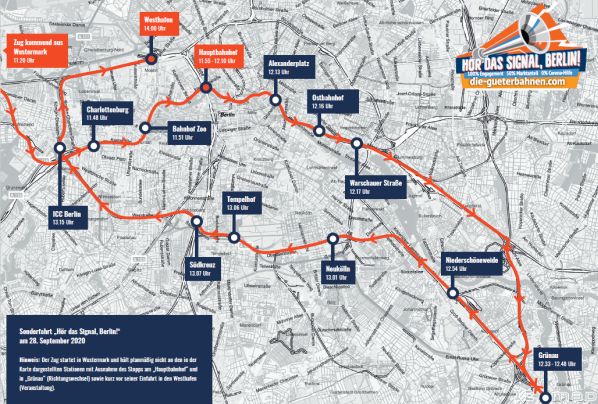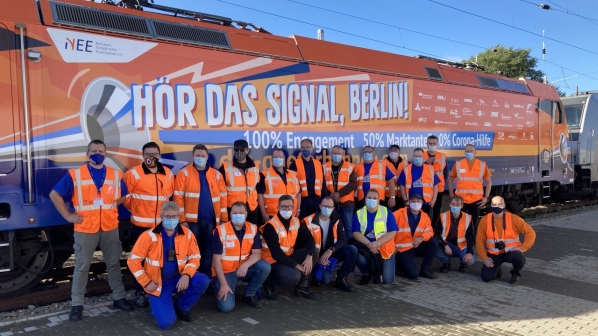Despite private operators carrying more than 50% of freight volumes in Germany, they are yet to receive any funding from the government to recover losses from the pandemic. Conversely, DB is receiving billions of euros in government support, which private operators argue could be used to prop up commercial subsidiaries such as DB Cargo, which reported a loss of €352m in the first half of 2020.
The protest organised by the Network of European Railways (NEE) saw a train comprising 20 locomotives run through Berlin via Alexanderplatz, Ostkreuz, Rummelsburg, Grünau, Neukölln, Südkreuz, Halensee, Westkreuz, Jungfernheide and Moabit to the Westhafen on September 28, stopping at Berlin Main Station at midday for speeches.

NEE managing director, Mr Peter Westenberger, says they have unsuccessfully been trying to arrange government support since the spring. “However, the equity injection for DB, which was proposed by the government in May, would only help its freight transport subsidiaries,” he says. “With the special trip, the competitors now want to visibly and audibly remind the federal government of its obligations under European law to maintain fair competition on the rail network.”
“We demand that the federal government does not grant preferential treatment to the federally-owned DB Cargo,” NEE CEO, Mr Ludolf Kerkeling, said in a speech prior to the train’s departure. “In particular, competitors should not be excluded from the planned Covid-19 aid. The capital injection from taxpayers’ money planned only for DB is inadmissible under EU competition law because, among other things, it enables DB Cargo to price its competitors out of the market.”
NEE is calling for concrete measures to be taken to reduce the impact of the state aid on competition in the rail freight market. The first is the termination of the existing profit and loss transfer and control agreements within the DB group.
“This would mean that the losses of DB Cargo, which are not solely due to the pandemic, would no longer be automatically compensated by the DB Group or the state,” Kerkeling says. This would result in DB Cargo being subject to the same market conditions as private operators.
The second measure called for by NEE is for DB Cargo to repay the support already received from the government “within a reasonable period of time - either through income from successful business activities or through the sale of shares in the company.”
“Our members have long been the sole drivers of growth in rail freight transport,” Kerkeling says. “They all want to make an even greater contribution to modal shift through modern, customer-oriented services. They want to put the Covid-19 crisis behind them as quickly as possible and not be shrunk by the federal policy fixated on DB.”
The 20 locomotives have a combined power of 100MW, although only one locomotive will be used the haul the train. The protest is operating along a train path booked to prevent conflicts with existing services, which was arranged following discussions with infrastructure manager DB Networks.

